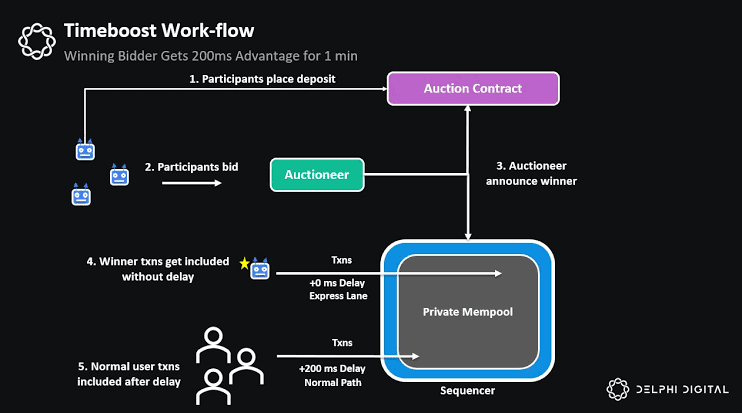
Timeboost is a transaction ordering mechanism introduced by Arbitrum to optimize how transactions are sequenced. Instead of the traditional First-Come, First-Served (FCFS) model, Timeboost allows users to bid for priority in transaction inclusion.
Imagine you and others are sending swaps to a DEX. With Timeboost, if you attach a small priority bid, your swap jumps ahead. Even if someone else clicked first. You're paying to be picked faster. Here's some key components of Timeboost :
Mitigate latency races: By allowing users to bid for priority, Timeboost reduces the need for users to invest in faster hardware or spam the network to get their transactions processed first.
Capture MEV (Maximal Extractable Value): It provides a structured way to capture MEV, ensuring that the value doesn't solely go to searchers but can benefit the broader ecosystem.
Maintain a private mempool: This helps in preventing front-running and sandwich attacks, enhancing user security.
How Does Timeboost Work?
Timeboost operates on a sealed-bid, second-price auction model, it goes through some internal mechanism to put the final results :

Bidding: Users submit bids along with their transactions, indicating how much they're willing to pay for priority inclusion.
Auction: The highest bidder wins the "express lane" for a specific time slot, typically 60 seconds.
Pricing: The winner pays the amount of the second-highest bid, ensuring fairness and preventing overpayment.
Inclusion: The winning transaction is included with priority, while others follow based on their bids or default sequencing.
This mechanism ensures that transactions are ordered not just based on arrival time but also on the value users place on priority inclusion.
Economic Implications
Timeboost has significant economic benefits. Right after the launch it got real hype and that helped it becoming one of the fastest revenue generating thing on Arbitrum :

Revenue Generation: Within just one day of its launch, Timeboost generated approximately $2,492 in revenue for the Arbitrum DAO.
MEV Redistribution: By structuring MEV capture through auctions, it ensures that the value is redistributed within the ecosystem rather than being monopolized by a few entities.
Potential for ARB Stakers: Estimates suggest a potential $30 million opportunity for ARB stakers, highlighting the mechanism's profitability.
Security and Fairness
Security always been the key aspect of Blockchain technologies, with security the Question of fairness also play a pivotal role :
Private Mempool: Transactions remain private until they're included in a block, preventing malicious actors from exploiting transaction data.
Protection Against MEV Exploits: By structuring MEV capture through auctions, it reduces the chances of front-running and sandwich attacks.
Fair Access: The auction model ensures that all users have an equal opportunity to bid for priority, promoting fairness.
Impact & Benefits
The introduction of Timeboost has several benefits, it's has some drastic change over the Ethereum :

Enhanced Transaction Efficiency: By allowing users to bid for priority, it ensures that high-value transactions are processed promptly.
Reduced Network Congestion: The auction model discourages spam and reduces unnecessary network load.
Improved User Experience: Users now have more control over their transaction processing times, leading to a more predictable and efficient experience.
If You still feel this as a alienated content. Feel Free to Comment us, we'll try out best to bring a Explain Like I'm Five version of it.

